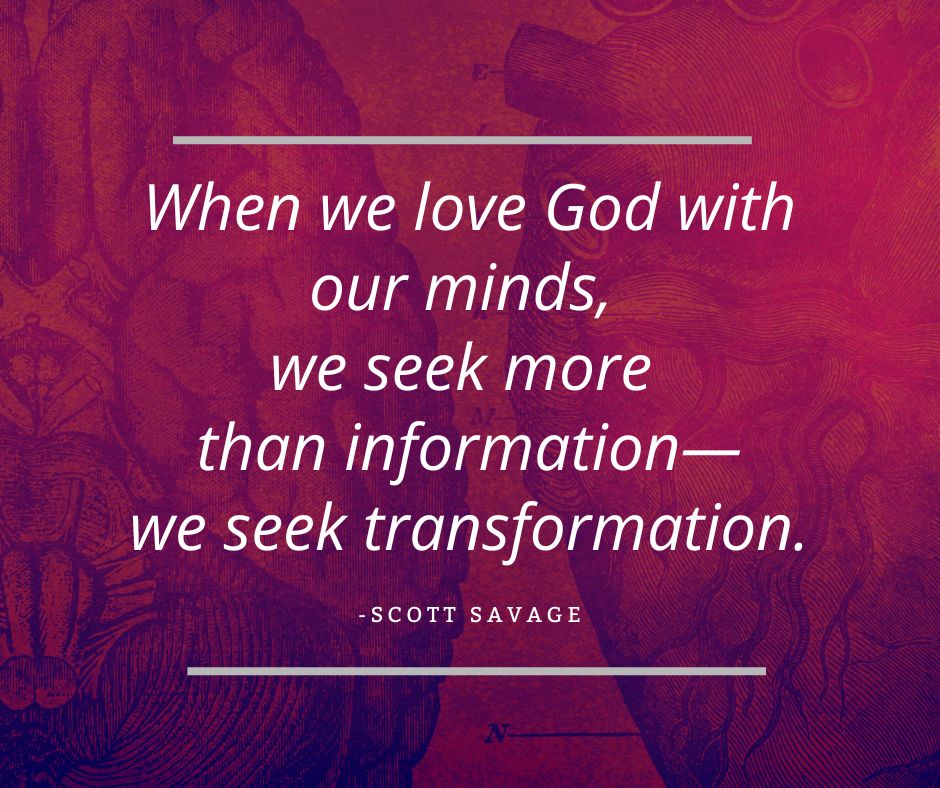All of You: Learning to Love God With Your Whole SelfSýnishorn


There's an old story about a Sunday school teacher who shared a riddle with her students. She asked them to raise their hand when they knew the answer to the riddle.
She said, "This is an animal, and it's small." She continued, "It can run up trees. It has a fuzzy tail." Surprised no one raised their hand, she continued, "It collects nuts for winter. You've probably seen them in your backyard." Perplexed that no one knew the answer, she stared at the children until one child raised his hand. He said, "I know the answer is supposed to be Jesus, but it sure sounds like a squirrel."
That story is a bit cheesy, but after having served as a pastor for nearly 20 years, it's not far from the truth. I'm saddened by the tendency of many people to check their brains at the door when they enter church environments. This tendency stands in stark contrast to Jesus' words in Mark 12, where He told His disciples to love God with all their minds.
As I've been meditating on Jesus' invitation to love God with all of us, a thought came to me. There's a difference between knowledge of God that merely informs you and knowledge of God that transforms you.
Earlier in Mark 12, Jesus encountered some religious leaders trying to trap Him with their questions. The first verbal battle concerned paying taxes to Caesar. In this instance, Jesus offered the famous response, "Give to Caesar what belongs to Caesar and give to God what belongs to God."
Later, Jesus replies to a verbal trap about marriage and the resurrection by teaching these religious leaders about the character and nature of God, something they should have already known themselves.
These encounters show us that seeking knowledge of God without alignment with God will cause you to miss God. We can try to love God with our minds and settle for merely accumulating knowledge about God. The religious leaders in Mark 12 knew a lot of facts about God, but they didn't know God. As a result, they failed to understand God's character.
Their problem wasn't limited to misunderstanding God's character and not knowing God personally. They also opposed God and His work in the world through Jesus.
When we love God with our minds, we seek more than information—we seek transformation. By seeking knowledge that leads to intimacy with God, we strive to love God more and become more like God ourselves.
How do we do that? First, we pray daily for wisdom, asking God to align our thinking with His wisdom as James 1 describes. Second, we exchange our anxious thoughts for God's peace, as Paul described in Philippians 4:6-7. Third, we take thoughts captive and make them obedient to Christ as 2 Corinthians 10 encourages. Fourth, we meditate on life-giving things like Philippians 4:8 outlines.
Loving God with your mind can be just as exhausting as a long run or a demanding weight-lifting session. But, since God is looking to transform all of us, we cannot check our brains at the door or leave them out regarding how we love God.
As we wrap up this plan tomorrow, we'll consider how we've overlooked our bodies in our relationship with Jesus. If you struggle to love your body, you'll enjoy what we'll explore together!
About this Plan

Do you ever feel tempted to hide parts of yourself to be loved by God or other people? Ever hold back in your prayers or worship of God? Me too! In this plan, I help you understand how God knows all of you and loves all of you. Learn how He wants you to bring all of you into your relationship with Him.
More








